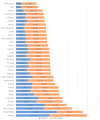Excessive Pregestational Weight and Maternal Obstetric Complications: The Role of Adipokines
- PMID: 37834125
- PMCID: PMC10572963
- DOI: 10.3390/ijms241914678
Excessive Pregestational Weight and Maternal Obstetric Complications: The Role of Adipokines
Abstract
There is a high frequency of overweight and obesity in women of reproductive age. Women who start pregnancy with overweight or obesity have an increased risk of developing maternal obstetric complications such as gestational hypertension, pre-eclampsia, gestational diabetes mellitus, postpartum hemorrhage, and requiring C-section to resolve the pregnancy with a higher risk of C-section surgical site infection. Excessive weight in pregnancy is characterized by dysregulation of adipokines, the functions of which partly explain the predisposition of pregnant women with overweight or obesity to these maternal obstetric complications. This review compiles, organizes, and analyzes the most recent studies on adipokines in pregnant women with excess weight and the potential pathophysiological mechanisms favoring the development of maternal pregnancy complications.
Keywords: adipokines; cytokines; maternal obesity; pregnancy complications.
Conflict of interest statement
The authors declare no conflict of interest.
Figures




Similar articles
-
Association between Body Mass Index and Gestational Weight Gain with Obstetric and Neonatal Complications in Pregnant Women with Gestational Diabetes.Acta Med Port. 2022 Oct 3;35(10):718-728. doi: 10.20344/amp.15896. Epub 2022 Oct 3. Acta Med Port. 2022. PMID: 35471140
-
The effect of weight management interventions that include a diet component on weight-related outcomes in pregnant and postpartum women: a systematic review protocol.JBI Database System Rev Implement Rep. 2015 Jan;13(1):88-98. doi: 10.11124/jbisrir-2015-1812. JBI Database System Rev Implement Rep. 2015. PMID: 26447010
-
The effect of gestational weight gain by body mass index on maternal and neonatal outcomes.J Obstet Gynaecol Can. 2009 Jan;31(1):28-35. doi: 10.1016/s1701-2163(16)34050-6. J Obstet Gynaecol Can. 2009. PMID: 19208280
-
Impact of overweight and obesity on obstetric outcomes.J Endocrinol Invest. 2014 Apr;37(4):323-9. doi: 10.1007/s40618-014-0058-9. Epub 2014 Feb 11. J Endocrinol Invest. 2014. PMID: 24515300 Review.
-
Position of the Academy of Nutrition and Dietetics: Obesity, Reproduction, and Pregnancy Outcomes.J Acad Nutr Diet. 2016 Apr;116(4):677-91. doi: 10.1016/j.jand.2016.01.008. J Acad Nutr Diet. 2016. PMID: 27017177 Review.
Cited by
-
Total Gestational Weight Gain Is Explained by Leptin and Body Fat, Regardless of Pre-Pregnancy Body Mass Index and Other Adipokines, in Mexican Adolescents.Nutrients. 2024 Jul 5;16(13):2147. doi: 10.3390/nu16132147. Nutrients. 2024. PMID: 38999894 Free PMC article.
-
Pathophysiology of Maternal Obesity and Hypertension in Pregnancy.J Cardiovasc Dev Dis. 2025 Mar 3;12(3):91. doi: 10.3390/jcdd12030091. J Cardiovasc Dev Dis. 2025. PMID: 40137089 Free PMC article. Review.
References
-
- A Healthy Lifestyle—WHO Recommendations. [(accessed on 15 May 2023)]. Available online: https://www.euro.who.int/en/health-topics/disease-prevention/nutrition/a....
-
- NCD Risk Factor Collaboration (NCD-RisC) Worldwide trends in body-mass index, underweight, overweight, and obesity from 1975 to 2016: A pooled analysis of 2416 population-based measurement studies in 128.9 million children, adolescents, and adults. Lancet. 2017;390:2627–2642. doi: 10.1016/S0140-6736(17)32129-3. - DOI - PMC - PubMed
-
- World Obesity Global Obesity Observatory. [(accessed on 20 May 2023)]. Available online: https://data.worldobesity.org/
Publication types
MeSH terms
Substances
LinkOut - more resources
Full Text Sources
Medical

